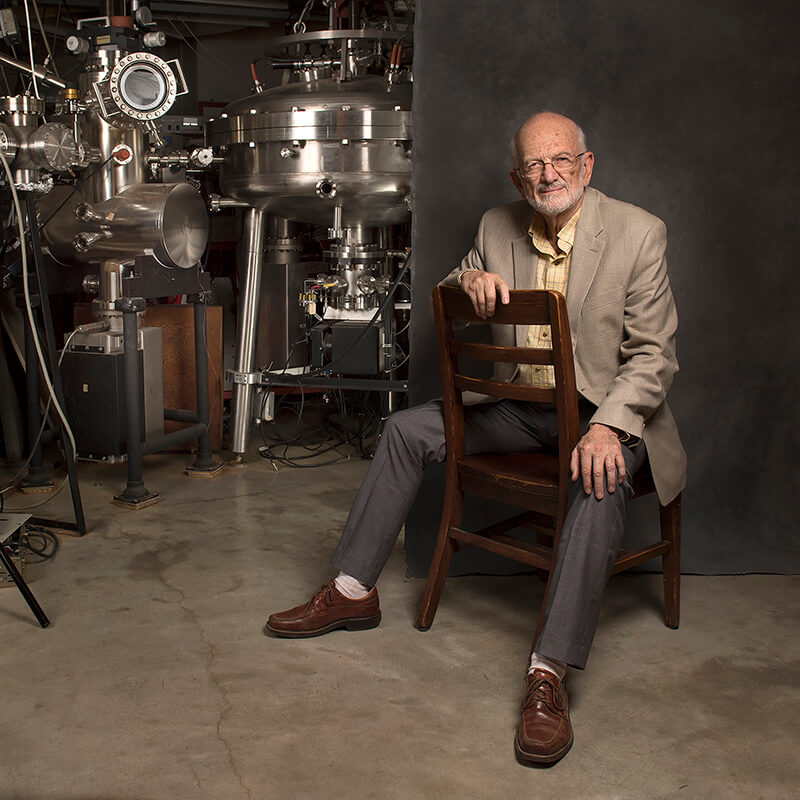June 23, 2020
Chemistry innovator widening, quickening uses of spectrometry
 Graham Cooks in his lab. (Purdue University photo/John Underwood)
Download image
Graham Cooks in his lab. (Purdue University photo/John Underwood)
Download image
WEST LAFAYETTE, Ind. — The clock is ticking when a neurosurgeon is trying to remove a brain tumor but also determining its malignancy and type. Instead of sending samples to a lab where the necessary testing equipment resides to answer those questions, a Purdue scientist is working on shrinking that equipment for use in the surgical room.
Compressing a mass spectrometer into a smaller, more portable system allows researchers to take the instrument into the field, running analyses on samples on the spot. Airports screening for explosives, grocery stores testing for bacteria on fruits and vegetables, and investigators collecting evidence at crime scenes are just a few possible uses.
“We live in a chemical world, and we need to analyze it,” R. Graham Cooks said. “It’s taking the instrument to the problem rather than taking a sample from wherever to the instrument. This is all about chemistry and chemical analysis. Miniature instruments are intended to make the most of the capabilities of mass spectrometers.”
Cooks is the Henry Bohn Hass Distinguished Professor of Chemistry at Purdue. He has pioneered tandem mass spectrometry and the miniaturization of the mass spectrometer – from the size of a small room to roughly the size of a shopping bag. He has worked with the Purdue Research Foundation Office of Technology Commercialization to patent a variety of technologies.
“Graham Cooks is a superb example of our Purdue innovators who have taken their knowledge and created technologies that have impacts around the world,” said Brooke Beier, vice president of the Office of Technology Commercialization.
Early in his career, he helped revolutionize the field through the development of tandem mass spectrometry, which allowed for the quantification and identification of the molecules present. He later developed ambient ionization techniques that paved the way for faster, more portable mass spectrometry devices. The techniques eliminated the need for samples to be chemically manipulated and contained in a vacuum chamber during analysis and allowed testing to be done in the air or directly on a surface in its natural environment.
The process of shrinking mass spectrometers is comparable to the way that computers were transformed over time from large, heavy machinery into the small, lightweight phones and tablets people carry everywhere with them today. Standard mass spectrometers weigh hundreds of pounds and are expensive to purchase and operate. Miniaturizing the instrument reduces their weight, cost, and power usage. As a result, mass spectrometry can be made available to the masses. More importantly, it puts the equipment in the hands of those who need it most, such as soldiers, firefighters, and even doctors in operating rooms.
“I’d love the public to know that help is coming,” Cooks said.
Acquiring real-time chemical information during surgery is one application that greatly interests him. The miniature mass spectrometry could be used for grading brain tumors, which involves analyzing the lipid profiles of malignant cells, on the spot. This could speed up the process for doctors, improve their efforts during surgery and, potentially, save patients’ lives by helping avoid costly mistakes.
“Brain surgery is performed without acquiring chemical information,” Cooks said. “It’s done by physical and optical means, but the brain is a chemical object that is being manipulated in surgery. It’s strange that you wouldn’t know what you’re doing in a chemical sense during that kind of operation. It’s unfortunately primitive.”
Though the potential applications of the miniature mass spectrometers are important, the challenge lies in maintaining the integrity and accuracy of the instrument while shrinking its features. Cooks has been investigating downsides to the currently available mass spectrometers and their potential solutions in his quest to help design a more accurate instrument.
“You make chemical measurements on everything, and mass spectrometers are the major analytical instruments and the major method of taking these measurements,” he said.
Cooks said better efficiency could be game-changing in many areas, including brain surgery, forensics, agriculture and food safety.
“These are all chemical measurements, and mass spectrometry is the underlying gold-standard method that’s used for all of those things,” he said. “If you can make those experiments faster and still retain the specificity, then you’ve got a new day dawning.”
Cooks has been working in mass spectrometry for over 50 years, receiving numerous honors. In 2015, he was elected into the National Academy of Sciences, one of the highest honors given to a scientist in the United States.
Cooks continues to find more challenges to pique his interest. Making chemical analysis more accessible was one giant leap. His next step is to help make chemistry greener by reducing the amount of waste solvent generated by chemical reactions. He and his team are working on a novel approach to recycling solvents produced by accelerated microdroplet solution reactions. Their work aims to both increase the speed of important chemical reactions to assist with drug discovery and decrease the waste produced by the process. Chemical waste is a significant source of pollution, and reducing the amount of resulting waste through green chemistry while accelerating chemical reactions is an exciting challenge for innovators like Cooks.
“This work is important because large numbers reactions can be screening in a short period of time. Chemical reaction screening is something pharmaceutical companies do all the time.” Cooks said. “It’s the basis of drug discovery.”
Writer: Sarah Olson Michel
Media contact: Steve Tally, 765-494-9809, steve@purdue.edu, @sciencewriter
Source: R. Graham Cooks, 765-494-5263, cooks@purdue.edu
Note to Journalists: A portrait photo of Graham Cooks is available at on Google Drive.

